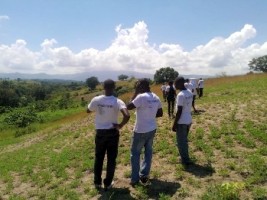Haiti Libre:
 |
Because of its economic and agricultural potential but also the high rate of food insecure people and its vulnerability to climate hazards, including drought, the Department of Northeast is the subject of special attention of the Organization United Nations Food and Agriculture Organization (FAO) and the European Union (EU) that have introduced in January 2013 a project to improve food security in the Department. This project whose closing was scheduled for the end of 2015 has been extended for 12 months.
The four communes of Northeast Department targeted by the project are: Ouanaminthe, Fort Liberté, Ferrier and Capotille. Family farming of these border areas to the Dominican Republic is characterized by small individual volumes and relatively high production costs.
The project, fully funded by the EU to the tune of 4 million euros, is part of the 2013-2016 Triennial Programme for Agricultural Recovery. It returns immediately in the priorities of both Haiti for Food and Nutrition Security, for the fight against poverty and agricultural development, while aligning with Sustainable Development Goals (SDGs) for the year 2016.
The project intends to strengthen the production capacity, of processing, marketing of family farming systems to better exploit market opportunities and other development prospects. In this approach, the approach “Farmer Field School” ‘(CEP) is used as the extension means to encourage producers to adopt good agricultural and business practices and better organization.
This method, developed over 25 years by FAO in many countries is a recent introduction in Haiti. It consists of a participatory learning by observation, experimentation, practice and technical decision-making between agricultural producers.
78 Farmer Field Schools have been set up in the Department of Northeast, each involving about twenty producers in different areas and sectors, including groundnuts, cassava, horticulture, milk, aquaculture, among others. They benefit from the support of the project in the field they have chosen themselves, including sustainable production, processing according to quality standards and marketing in association of their processed products.
The CEP also receive support for the promotion and marketing of their products on the market. During the three years of implementation (2013-2015), local food availability experienced a net improvement by the increase in productivity and agricultural production and animal husbandry; the food and horticultural products were valued, the processing capacity and marketing of producers improved and an increase in their income was also recorded.
The Ministry of Agriculture and the European Union are convinced by measurable results and significant of the approach “Farmer Field School” promoted by FAO in Haiti in recent years, inb the perspective of a family farming more profitable and sustainable.
Download the document “Approach Farmer Field School in Haiti” : http://www.haitilibre.com/docs/a-au457f.pdf (in french)
HL/ HaitiLibre